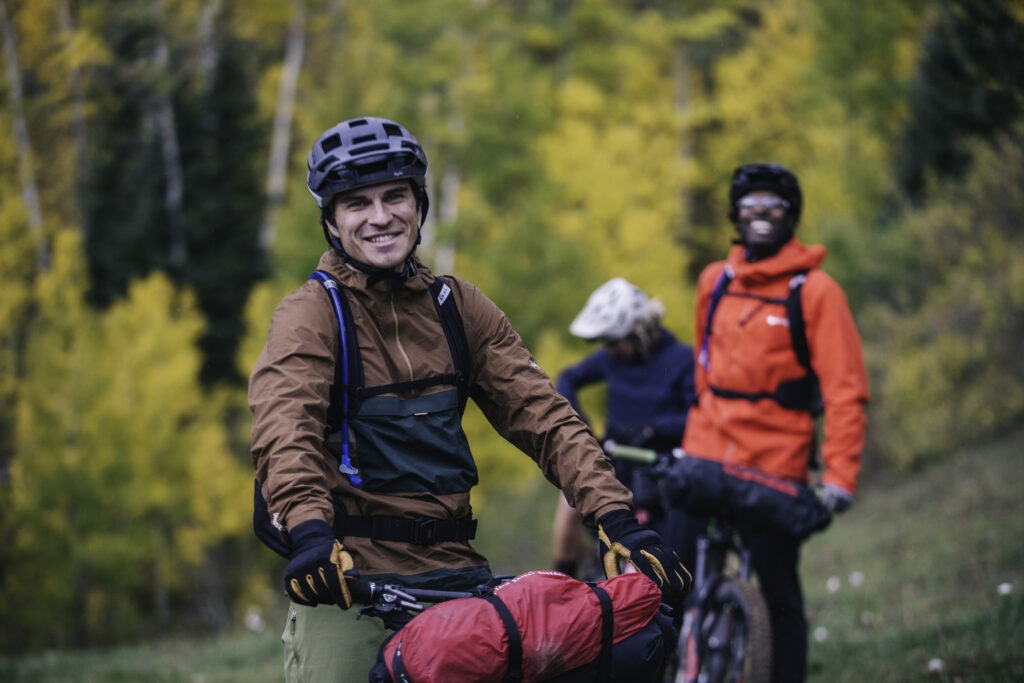“Usufruct” Showcases the Impacts of Beetle Kill on the Trails of the Rocky Mountain West
Photo by Andy Chochrane
Usufruct
u·su·fruct/ˈyo͞ozəˌfrəkt,ˈyo͞osəˌfrəkt/
Noun
The right to enjoy the use and advantages of another’s property short of the destruction or waste of its substance.
Usufruct has been a term with deep meaning for mountain biker, scientist and POW Athlete Alliance member, Dillon Osleger. Growing up in agricultural communities between Davis and Truckee, California he spent much of his formative years observing how farmers work with their land so that they can continue to have successful crop seasons year after year. This concept is a biblical term, known as Brecht, and is a very common practice in ranching, farming and agriculture. “It’s about understanding the place that you’re in and taking care of it, so it takes care of you and you can hand it down to future generations,” said Osleger.
Osleger’s Truckee roots and love for the outdoors distilled a deep belief in protecting the places in which we live and recreate so that we can pass them down to future generations. “I don’t see why sports should be any different than agriculture or farming, it’s the exact same tenant,” said Osleger.
While we may not see the immediate connection, the farming and outdoor industry both face similar threats due to climate change. “Currently, agriculture has about 60 harvests left, so about 30 years’ worth of good soil to use for growing food,” said Osleger. “In a very similar vein, we have about 30 years of consistent snowpack, or skiing, left in a lot of places in the United States.”
Despite this reality, as members of the Outdoor State, we’re up for the challenge of protecting the lifestyles that we love so we can hand them off to the next generation. We can protect our outdoor playgrounds by coming together, paying attention to what’s happening in the places we recreate and giving back to them in order to restore them.This core value inspired Osleger to take action himself, becoming a scientist specializing in climate and geomorphology, an ecologist for the National Park Service and starting his own non-profit, Sage Trail Alliance, for trail stewardship around Lake Tahoe.

During his time with the National Park Service, he studied the effect Pine Bark Beetle in the Rocky Mountains was having on whitebark pine which led him to realize that these effects are part of both his recreation and non-profit life. “All the trails that I like to ride end up covered in wind fallen beetle kill or burn because of climate change,” said Osleger. “And as a nonprofit, I spend probably about $20 to $40,000 per year clearing trails that are impacted by beetle kill and forest fire.”
Osleger took his scientific pursuit and came up with the idea for a work of art: Usufruct. In collaboration with Adam Wells (co-director, cinematographer) and Andy Cochrane (co-director, co-producer), Usufruct is a short film about beetles and the future of our forests. While on a bikepacking adventure between Durango and Pagosa Springs, Colorado with his friends Sarah Sturm and Evan Green, the film helps shed light on the interconnectedness of beetle kill forests, wildfire, and climate change, and how that threatens our everyday lives and the outdoor lifestyles that we love.
What is Beetle Kill?
While filming Usufruct, Osleger’s crew only biked approximately 60 miles. They wanted to take it slow, take in the beauty and have the time to really observe and absorb the climate-related impacts happening in Southwestern Colorado. By taking it slow, they were able to get an up close look at how the beetles are interacting with the trees.
There is nothing abnormal about beetles, nor the trees that they inhabit. They are both native species to the United States’ Rocky Mountain west and there are multiple different types of beetles that interact with different trees. The beetles burrow into the trees and release a fungus along with their larva that decomposes the tree. The result is called girdling, where the trees are cut off from their circulatory system. The larva then ends up eating the tree alive, surviving and continuing its life cycle.

Neither the trees nor the beetles are the problem here. The problem we face is warming temperatures and changing seasons. The trees have a natural defense mechanism that kicks in with early-season cold snaps and frosts. When the cold hits, the trees will push the beetles out by expelling a mix of water and sugar, a substance similar to sap. The trees rely on early-season frosts to survive. “What we’re finding is that these early season frosts are getting pushed back or pushed upwards in elevation due to warming temperatures,” said Osleger. “Without the frosts the beetles not only have more offspring that survive, but they can survive at higher elevations.”
The result leads to entire swaths of beetle-killed “zombie forests” incredibly susceptible to wildfires. “The lifespan of the beetles is so short compared to the trees that the beetles can evolve to climate change faster which disrupts the trees natural cycle,” said Osleger. “Then we have these massive forest fires because the trees are already dead and there’s no such thing as management in something that is that askew.”
During the backpacking adventure, Osleger recalled getting to the top of Wolf Creek Pass and not seeing a single living tree in the whole area for thousands of acres. “Just seeing a place that will clearly burn in a massive wildfire in the next couple of years is eye-opening and interesting,” said Osleger. “It’s kind of strange that it will look no different once it burns since it’s already dead.”
The Silver Lining
Seeing these impacts of climate change firsthand can feel just as daunting as stepping onto a mountain bike for the first time, or looking down at a steep pitch. What we don’t realize is that there are a lot of people in the Outdoor State already doing their part to help mitigate these threats. Osleger said the most inspirational takeaway of creating Usufruct was spending time with his two bikepacking mates, Sarah and Evan, and learning about how they give back to their own communities. “It’s always a nice reminder that most people are genuinely trying to do good,” said Osleger. “Outdoor recreation and environmentalism really is front of mind for them, and they express it outwardly by working in their own communities.”

We can all use our collective voices to speak up for what what’s happening in the outdoor world. “In Montana, less than a 10th of the number of people who voted in the general election played a part in a forest service plan that’s going to determine the next 30 years of recreation and extraction within the state,” said Osleger. “Everyone had a chance to speak out against all the mining and logging that’s going to happen in Montana’s National Forests, so it’s important that we get involved and start using our voices at the local level”
Osleger encourages anyone who recreates on trails, whether it be by bike or foot, to start expressing their passion for our outdoor spaces more outwardly. Conservation starts locally and as members of the Outdoor State we can educate ourselves and our community on what’s happening in our local National Forest and be a part of the conversation and the solution. “Attending calls and meetings for Forest Service plans can make a huge difference,” said Osleger.
POW Bike
Osleger is one of POW’s first bike Athlete Alliance members and he’s excited for what’s to come. “I think it’s a really cool opportunity to bring the triangle of the sport within biking back to equal lateral,” said Osleger. “Right now it’s very titled with racing being at the top and the community aspect of riding is less focused on.”
Taking an individual sport and creating community is what POW Bike is all about. “Getting people involved with local trail stewardship and playing a part in their local recreation decisions is huge,” said Osleger. “It will give more people in the outdoor space a sense of what’s going on and give them a little more confidence when it comes to local politics and conservation.”
Osleger encourages other cyclists to get involved according to their own means to help make a difference. “Find your local non-profit and help them with whatever skills you bring, get involved, talk with your district supervisors, city planners and recreation plan managers about creating more equitable access to nature and making more climate-conscious decisions,” said Osleger. “Local politics is often undervalued or under idolized, but it really does make a difference to get involved.”
Celebrate Earth Day this year with us by Joining Team POW to #CrushIt4Climate with us! Following your adventure grab your favorite snack and beverage of choice and unwind with the online world premiere of Usufruct on Friday, April 22 at 7:30 PM MST. Following the film will be a live Q&A with Dillon Osleger, Sarah Sturm and Amanda Monthei

Author: Stacie Sullivan
Stacie always knew she wanted to pursue a career in the ski industry from a young age, having first clicked into skis at the age of 4 and writing her 8th grade career project on being a professional skier. While her dreams of becoming a professional athlete didn’t quite pan out the way she planned at […]
